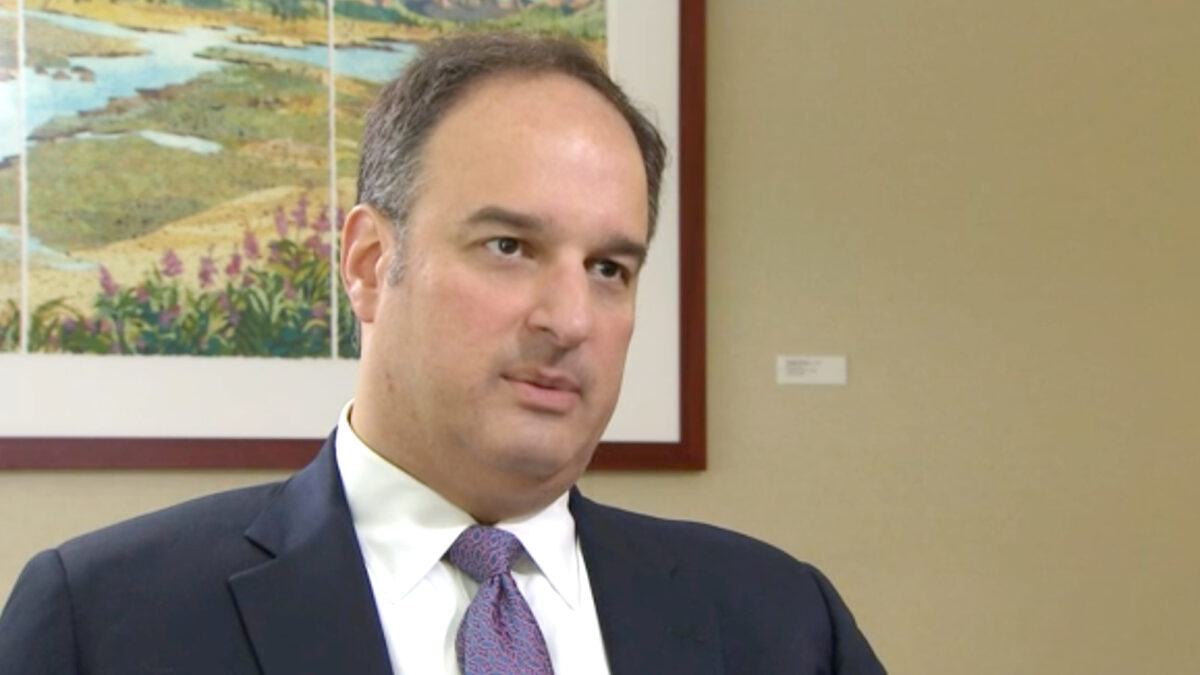
Former Hillary Clinton campaign lawyer Michael Sussman, who is accused of lying to the FBI when he claimed he was not handing over information about then-candidate Donald Trump in 2016, made false statements to CIA officers in a meeting after Trump was sworn into office, according to new filings by Special Counsel John Durham’s team.
Sussman told James Baker, at the time the FBI’s general counsel, that he had “time-sensitive (and sensitive)” information to share before the pair met, according to a text message recently disclosed by prosecutors. In the same message, Sussman claimed he was “coming on my own—not on behalf of a client or company,” even though he’d been directed to deliver the information by Rodney Joffe, a technology executive, and billed the Clinton campaign for the work, according to prosecutors.
Sussman provided Baker in a Sept. 19, 2016, meeting with white papers that alleged Trump’s business had a secret channel with a Russian bank, allegations the FBI later determined were untrue.
On Feb. 9, 2017, Sussman met with CIA officers—where he also made false statements, according to the new filings.
A memorandum introduced by the special counsel’s team and penned by a CIA official said that Sussman provided documents and thumb drives that he claimed contained data related to potential Russian activities linked with Trump.
Sussman “advised that he was not representing a particular client,” according to the notes. Instead, he said he was conveying information from “contacts” who he believed “were acting in good faith and out of a sense of loyalty to the USG,” or U.S. government.
That contradicts how Sussman told a former CIA employee, who was said to have helped set up the February meeting, that he “represents a client who does not want to be known,” according to notes of the meeting taken by the former employee.
It also contradicts testimony Sussman delivered to the House Intelligence Committee. Under oath, Sussman said (pdf) he received the information “from a client of mine.”
Sussman said he learned of the information by the summer of 2016 but only came forward months later because President Barack Obama ordered an intelligence review of possible Russian interference in elections.
“This information seemed to fall roughly within that, and so I thought that might be—or my client thought that that might be something that was relevant for those that were gathering information regarding foreign-based actors,” Sussman said.

Another apparently false statement relates to what Sussman said during the meeting with the CIA concerning his previous meeting with the FBI.
Sussman gave the same information regarding the alleged secret channel to the CIA that he had to Baker. Sussman told the officers he had previously contacted Baker but on a “similar, though unrelated, matter,” according to the memo.
In front of the congressional panel, Sussman said he had already passed on the information to the FBI before he met with the CIA.
“In context, the defendant’s statement that he had provided the FBI with ‘similar, though unrelated’ allegations is false, or at best, misleading,” Durham’s team said in one of the new filings.
Further, the CIA later concluded both the claim about the secret channel and a separate allegation, which was brought to the CIA and not the FBI, concerning Russian-made phones was “technically plausible,” did not “withstand technical scrutiny,” “contained gaps,” and “conflicted with [itself],” and was “user created and not machine/tool generated,” according to the special counsel’s office.
Sussman’s lawyers in a separate filing said their client’s statement to the CIA “cannot possibly be part of the charged offense (concerning a single, different statement), and it was not made contemporaneously with the charged crime,” adding, “In fact, it was made five months later, in different circumstances, to a different agency, in a way that conflicts with the Special Counsel’s theory that Mr. Sussmann lied to Mr. Baker to help Hillary Clinton win the election—because the election was long since over.”
The lawyers are not objecting to the admission of one of the statements Sussman made to the House panel concerning the CIA meeting but are objecting to the introduction of any evidence concerning the accuracy of the data he provided to the CIA.
They also reserved the right “to introduce evidence rebutting the Special Counsel’s claims, including evidence that will demonstrate that Mr. Sussmann disclosed to CIA personnel that he had a client and that he had worked with political clients.”
According to the CIA memo, Sussman did mention that his law firm was involved with Democrats, including Clinton, but also said that work was unrelated to his reasons for contacting the CIA.
Sussman’s trial is slated to start on May 16 at federal court in Washington.